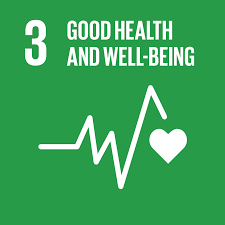The Truth About Depression
- Yamini

- Nov 17, 2020
- 3 min read
This article is focused on the following UN Sustainable Development Goal:
What is Depression? I’m sure you’ve heard of it a hundred times and have a vague idea of what it is, but do you really know what it’s like to go through it? Usually, people who suffer with depression are told that they’re just being “dramatic” or “seeking attention”. Their feelings are invalidated; they are told to just “get over it.” It’s common to feel down from time to time, but depression is a separate condition that should be treated with caution. Depression is a mental health mood disorder characterised by persistently depressed mood or loss of interest in activities, causing significant impairment in daily life. Multiple things can cause depression such as faulty mood regulation by the brain, genetic vulnerability, stressful life events, medications, and medical problems. This mental illness can even cause physical changes to the brain. It may shrink the hippocampus, largen the amygdala and even cause brain inflammation.

Symptoms of Depression include:
Feeling sad or having a depressed mood
Loss of interest or pleasure in activities once enjoyed
Changes in appetite — weight loss or gain unrelated to dieting
Trouble sleeping or sleeping too much
Loss of energy or increased fatigue
Increase in purposeless physical activity (e.g., inability to sit still, pacing, handwringing) or slowed movements or speech (these actions must be severe enough to be observable by others)
Feeling worthless or guilty
Difficulty thinking, concentrating or making decisions
Delusions
Hallucinations
Thoughts of death or suicide
Some people experience mild depression where symptoms could include feeling hopeless and sad for two weeks while major depression can lead to delusions and suicidal thoughts for long periods of time.
To give you a better feel of what it feels like to have depression here are a few things people with depression have experienced:
“I pretty much stopped eating. I was sleeping constantly and my grades were appalling. I just lost interest in absolutely everything.”
“The irony was that if you had spoken to me, you wouldn't have said there was a suicidal guy. I was pushing the negative things away and they were bursting out in uncontrollable episodes. Dark moods would overcome me and I would flick into suicidal mode.”
“There was self-harm and cutting. That led to three years of not being able to work, being on benefits, constantly ill, four hospital admissions, an absolute three-year hell. Nothing seemed to work.” (Rice-Oxley, Mark 2012)
Overall, depression is not something someone can just “get over”. About 60 percent of people who commit suicide have had a mood disorder. Having suicidal thoughts or not being able to get out of bed for days is not “attention seeking”, but is a mental disorder. It is serious. Many people who face depression deal with it all by themselves because of the stigma around it. Here are a few things you can do to make someone with depression feel supported:
Be patient with them: Avoid assuming a good day means they’re “cured,” and try not to get frustrated if a string of bad days makes it seem like your friend will never improve.
Stay in touch: Letting your friend know you still care about them as they continue to work through depression can help. Even sending a quick text saying “I’ve been thinking of you and I care about you” can help
Support them: Be supportive of them and avoid saying things like “it's just a phase,” or “you’re just being lazy.”
The feelings of people who suffer with depression matter and their voices matter. They are people who go through a hard time and treating them like attention seekers and invalidating their feelings is not the solution. You matter and your feelings are valid regardless of your circumstances.
Works Cited
Higuera, Valencia. “Everything You Want to Know About Depression.” Healthline, Healthline Media, 11 Feb. 2020, www.healthline.com/health/depression. Accessed Nov 15, 2020.
Rice-Oxley, Mark. “The Truth about Depression: Six People Speak Out.” The Guardian, Guardian News and Media, 14 Mar. 2012, www.theguardian.com/society/2012/mar/14/truth-about-depression.Accessed Nov 15, 2020.
External Links:
International Suicide Hotline: https://www.befrienders.org/
International Association for Suicide Prevention: https://www.iasp.info/resources/Crisis_Centres/






Comments